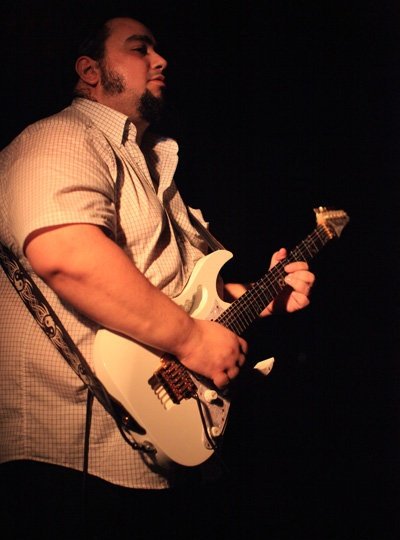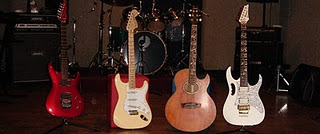On a typical Saturday morning, most people would be planning the rest of their weekend, or simply taking a brake from their week’s hectic demands. However, this isn’t the case with Amadeus Awad, one of the finest guitarists in the Middle East, and the first Lebanese musician to win the “Cannes Golden Lion” award. Amadeus is constantly at work; whether he’s composing music, or running his production company, “Broken Records”, this guy dedicates all his time to his ultimate passion; music. Fortunately though, he had some free time for a little interview, so I decided to drop by his office where we talked over a cup of coffee, and exchanged thoughts on guitars, theory, and several aspects musicianship.

- 1 – People usually start playing music after being inspired by a certain song or player that they relate to. What was it that inspired you to pick up the guitar, and how old were you when you did that?
I was first 6 years old when I started. I remember my brother, who used to play a bit before me, was watching a VHS tape, since there were no DVDs back then, of Deep Purple’s California Jam. I saw Ritchie Blackmore and was amazed; his character, his guitar, and his intensity were so incredible that I was suddenly driven to play the instrument! His style is so unique and powerful to a degree that so many players are influenced by him. Steve Vai, Yngwie Malmsteen, and Michael Romeo all have details of Blackmore’s style integrated in their own.
- 2 – Who do you cite as your major influences when it comes to composing music?
I’d have to say Ritchie Blackmore and Nicolò Paganini. Paganini had this amusing and controversial style. He claimed that he was inspired by the devil, and said that music is evil. I liked how he could speak his mind through his instrument, the violin. He could easily reflect himself through his music.
- 3 – When feeling uninspired, some musicians listen to music or put their instruments away for a while. What do you do in such cases?
Only life, and daily events can really inspire in the case of music. When musicians feel uninspired, they shouldn’t push themselves to compose because their music will sound too mechanical. The thing is, they shouldn’t search for inspiration, they should it let it come to them.
- 4 – Many musicians like to explore new concepts through jamming; how did the concept of jamming help you in developing your skills and style as a musician? Do you think that it’s a better way to to learn music than studying it formally?
Well, I studied music formally, and received a Master’s degree in music from Berklee College of Music through on-line courses. Prior to that, I had a Bachelor’s degree in musicology which I received here in Lebanon. The thing about jamming is that allows musicians to discover what sounds good with what, but studying music makes them understand how the pieces fit together. However, over-analyzing and over-thinking can make the music seem a bit too mechanical, so studying music and analyzing should only play a major role in the musician’s early stages of development. With time, it becomes natural to generate specific sounds without the need to analyze the theory behind music in too much depth. Chemistry among members in a band is also important in jamming and improvising. Actually, the thing is that the show we put on in “The Final Call” was entirely improvised, and the chemistry among the band members made it really natural.
- 5 – A lot of musicians here tend to ignore music theory saying that music is all about breaking rules and playing from your heart; do you think that it’s possible to be professional without learning theory?
No, and you really can’t break any rules. Every rule that’s “broken” leads to a new rule. For example, a note played outside a certain scale would fit into another scale, and this concept is widely used in jazz. A good example of “breaking rules” is Beethoven’s use of a coral in his 9th symphony, which was the first time that such a step was taken, and it made a great impact. So I guess it’s not really breaking the rules; it’s pioneering.
- 6 – Most guitarists go through a “jazz-fusion” phase during their careers and start experimenting with all sorts of scales and progressions to nail that jazzy sound. Did jazz and fusion have a big effect on your playing, and did you ever find yourself wanting to experiment in those areas?
No not at all. I’m not a “Jazzer” and never was one, although I listen to it very often. Music is about portraying what you feel. Jazz is not the field where I can do that. Fusion is great, however it is largely based on Major forms. I prefer Minor tonalities since they portray a sadder and darker side. In the words of Gibran Khalil Gibran, “Great pain breeds great art.”
- 7 – Let’s go deeper into the issue of composition; can you describe the writing process and how you come up with new ideas?
When something strikes me, I like to talk about it through my music. I sit down and try to write a hole idea. If it’s not done, I don’t go back to it later, but at the same time, I don’t forget it. One recent incident that really shook me up was the death Maria Nacouzi. When I found out about it, I was shocked and remained upset for several days, even though I didn’t actually know her. I imagined what her parents and the people that cared about her were feeling at that time and it grieved me a lot. This grief inspired me to compose and portray my emotions through my music.
- 8 – Where do you find yourself more comfortable and able to capture the true essence of your music; in the studio or on stage, and why?
On stage of course. I guess the term of “playing live” has something to do with the word “alive”. People give you energy to perform better, so there’s a mutual exchange in energy which drives you and makes you play in a different way, with more intensity. It actually makes music sound more alive and spontaneous.
- 9 – When you aim to come up with a solo, do you compose it referring to the chords and their structures, or do you just let go of all that and improvise?
Definitely improvising. I mean, looking at chord progressions and analyzing chord structures will usually end up with bad results when it comes to writing a solo. However, this form of composition is necessary for guitarists that are still developing their skills and musicianship, but improvising becomes more natural with time and analysis of music will become less necessary.
- 10 – Can you give us a walk-through of your live setup?
I have 4 guitars that I use live. An old Ibanez Jem777 for the heavier material, another Ibanez, the JS1200, for mellow and bluesy playing, and a Fender YJM Strat for playing stuff similar to Richie Blackmore’s style, and last up is the Ibanez Euphoria for the acoustic parts. My pedal-board consists of a Boss DS-1, an Electro-Harmonix Bigg Muff, a Visual Sound Jeckyll and Hyde, all used for different distortion sounds and a Visual Sound H2O for delay and chorus. The rack contains a Rocktron Hush noise suppressor, a Ganiac 2 full tube preamp, a Behringer rack tuner, and a Marshall El34/50 poweramp. The cabinet I use is a straight JCM800.

- 11 – A bit of technical question, but it has to be asked; can you describe your perfect guitar? And which company do you think would be able to produce such a guitar for you?
The perfect guitar already exists. It’s a Fender 1974 Strat, with a natural finish. It could be Ritchie Blackmore’s influence that made me want this guitar, since he used it in the California Jam concert!
- 12 – A lot of guitarists get caught in the speed trap, and start to play fast just for the sake of it. What do you think sets the border between fast playing and emotional playing? Do you think it’s difficult to maintain a balance between both?
It’s difficult to maintain a balance between both. If you want to say something loud, say it loud. If you want to say something softly, say it softly. The same analogy applies to speed. I don’t want people to remember me for my fast playing; I want them to remember my diversity. Speed is easy to achieve, and it is easy to overdo it. Jeff Beck once said, “don’t peak to soon”. He meant that getting to a fast part in a solo should be gradual; the player should start slowly and build intensity to “prepare” the listener for a fast part.
- 13 – You’re known to be one of the guitarists that integrates feeling into their playing; do you think that this comes naturally with experience or is it something you should intentionally work for?
It’s either you have it or you don’t. It’s very important to know what you’re doing. Music is felt through the senses, so it has to make you feel something. If you work to achieve this feeling, then your playing would most likely sound too artificial.
- 14 – The rock/metal scene in Lebanon has an uncertain future; looking at the new bands performing and the frequency of events taking place, do you have any anticipations about it?
I think we’re on the right track since we have bands like Kimaera are playing a show in Europe, and bands like Hail and Anathema performing here. The world is becoming more connected.
- 15 – So your band Sphere has been lying low for a while; are you guys preparing for an upcoming show or working on new material for instance?
Well we’re performing on the 8th of May along with Metamorphism during Oblivion’s demo release. I anticipate a good show, and hope people will come and have good time.
- 16 – Should the fans expect a solo album from you any time soon?
I’m actually in the recording phase now. I have international artists from U.S.A. and England performing on it as well. It’ll hopefully be done by December.
- 17 – To wrap it up, what advice would you give to the aspiring guitarists?
Play your heart out.









